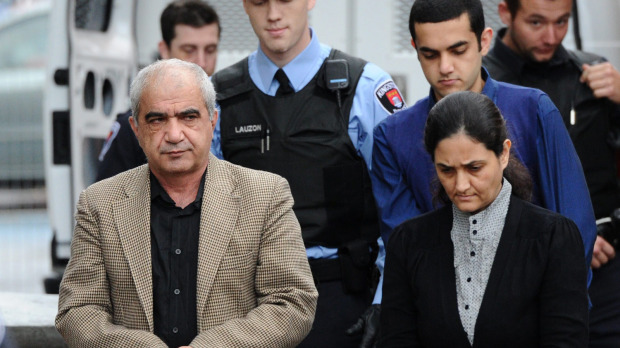The Blaze:
Muslim Family Found Guilty in Canadian Honor Killings

Mohammad Shafia, his wife Tooba Yahya and their son Hamed were each found guilty of murdering Shafia's three teenage daughters and wife. Their bodies were found in a car submerged in an Ontario canal in 2009. (Canadian Press Photo)
KINGSTON, Ontario (AP) — A jury on Sunday found an Afghan father, his wife and their son guilty of killing three teenage sisters and a co-wife in what the judge described as “cold-blooded, shameful murders“ resulting from a ”twisted concept of honor.”
The jury took 15 hours to find Mohammad Shafia, 58; his wife Tooba Yahya, 42; and their son Hamed, 21, each guilty of four counts of first-degree murder in a case that shocked and riveted Canadians from coast to coast.
After the verdict was read, the three defendants again declared their innocence in the killings of sisters Zainab, 19, Sahar 17, and Geeti, 13, as well as Rona Amir Mohammad, 52, Shafia’s childless first wife in a polygamous marriage.

Their bodies were found June 30, 2009, in a car submerged in a canal in Kingston, Ontario, where the family had stopped for the night on their way home to Montreal from Niagara Falls, Ontario.
Prosecutors said the defendants allegedly killed the three teenage sisters because they dishonored the family by defying its disciplinarian rules on dress, dating, socializing and going online. Shafia’s first wife was living with him and his second wife. The polygamous relationship, if revealed, could have resulted in their deportation.
The prosecution alleged it was a case of premeditated murder, staged to look like an accident after it was carried out. Prosecutors said the defendants drowned their victims elsewhere on the site, placed their bodies in the car and pushed it into the canal.
Defense lawyers said the evidence suggested that the deaths were accidental. They said the Nissan car accidentally plunged into the canal after the eldest daughter, Zainab, took it for a joy ride.
After the jury returned the verdicts, Mohammad Shafia, speaking through a translator, said, “We are not criminal, we are not murderer, we didn’t commit the murder and this is unjust.”
His weeping wife, Tooba, also declared the verdict unjust, saying, “I am not a murderer, and I am a mother, a mother.”
Their son, Hamed, speaking in English said, “I did not drown my sisters anywhere.”
But Judge Robert Maranger was unmoved, saying the evidence clearly supported their conviction for “the planned and deliberate murder of four members of your family.”
“It is difficult to conceive of a more despicable, more heinous crime … the apparent reason behind these cold-blooded, shameful murders was that the four completely innocent victims offended your completely twisted concept of honor … that has absolutely no place in any civilized society.”
The family had left Afghanistan in 1992 and lived in Pakistan, Australia and Dubai before settling in Canada in 2007. Shafia, a wealthy businessman, married Yahya because his first wife could not have children.
The months leading up to the deaths were not happy ones in the Shafia household, according to evidence presented at trial. Zainab, the oldest daughter, was forbidden to attend school for a year because she had a young Pakistani-Canadian boyfriend, and she fled to a shelter, terrified of her father, the court was told.
The prosecution presented wire taps and cell phone records from the Shafia family in court. In one phone conversation, the father says his daughters “betrayed us immensely.”
The wiretaps, which capture Shafia spewing vitriol about his dead daughters, calling them treacherous and whores and invoking the devil to defecate on their graves, were a focal point of the trial.
But defense lawyers argued that at no point in the intercepts do the accused say they drowned the victims.
-
Front Page Mag: Justice Served in an American-Islamic Honor Killing Posted by Phyllis Chesler Arizona Judge Roland Steinle has just sentenced Faleh Almaleki to 34½ years in prison. According to live reporting from the courtroom, the judge noted that...
- Buffalo Beheader Is Guilty Of 2nd Degree Murder
Muzzammil Hassan, the so-called bridge builder who murdered his wife Aasiya, has been convicted of 2nd degree murder (Hat tip: Jihad Watch, who's got a court video, and Weasel Zippers): BUFFALO, NY - The jury in the Muzzammil Hassan trial has reached...
-
UK: Innocent Couple Killed After House Firebombed in Botched “Honor Killing” From Weasel Zippers: Nothing to do with Islam… (Daily Mail)- An innocent couple died in a house fire at the hands of assailants who got the wrong address in a botched...
- Honor Killing In Egypt
I haven't been keeping up with this topic lately, so I don't know if this has been reported elsewhere. From this posting over at Tea and Politics:A terrible honor killing in Egypt I have not found this in English so I translate what I have found:...
- Bosnian Man Behind Attacks On Ex-wife
From : News from Norway A twenty eight year old woman has been physically assaulted by unknown and masked assailants on three separate occasions. The court case against a 29 year old man started to day in Oslo Courthouse. The man who’s accused of masterminding...
